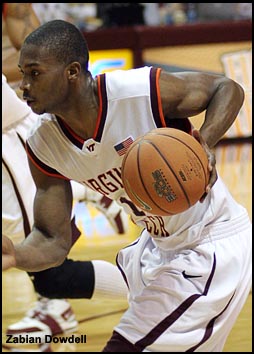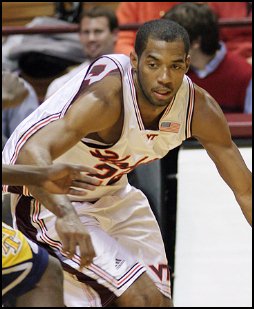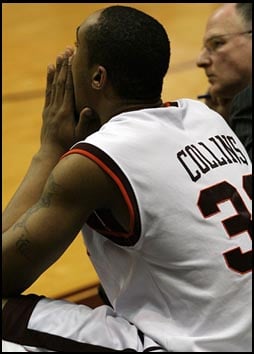Everybody talks about how the NCAA basketball tournament is far superior to the college bowl system, and maybe it is. That’s a debate for another time. But there’s at least one way in which it is far inferior to the bowl system: Unless you win the championship in basketball, your seniors walk off the floor as losers of their last game. That’s no way for Zabian Dowdell , Jamon Gordon and Coleman Collins to exit the game, but Sunday afternoon, that’s how the careers of three seniors who changed the face of Virginia Tech basketball ended.
At least with the bowl system, the seniors of thirty or so football teams get to leave as winners. Many other seniors playing for teams who don’t go to bowls also get to exit as winners in their last regular-season game. But college basketball is harsh to seniors. Everyone except the NIT winner and the NCAA winner leaves as a loser. There are a few exceptions in conferences like the Big East, where not all teams go to the conference tournament, but all but a tiny handful of seniors don’t leave the court happy in their last game.
It’s a nasty way to go. For Coleman Collins , victim of some iffy foul calls, his career ended early, with a trip to the bench. He got to watch his teammates go down in defeat over the last eight minutes, with Southern Illinois fans erupting in cheers as the Salukis ground it out in the half court offense and then tossed in three-pointers at the buzzer. At least Collins got an ovation as he trudged off the court the last time.
So did Dowdell and Gordon, who were pulled from the game in the last two minutes so they could end their careers receiving applause from the few hundred Hokie fans in existence. They got hugs and some encouraging words from Seth Greenberg, the coach who owes a good measure of his Blacksburg prosperity to them.
And then it was over.
Bitter. Helpless. Defeated by 15 points. No way to go out.
I drove 650 miles round trip on Sunday, for three reasons. The first two, I knew about ahead of time. Number one, it was the Hokies playing for a berth in the Sweet 16, and I needed to be there for professional reasons. Number two, if VT won, I wanted to be there to see the game that got them into their first Sweet 16 in 40 years.
I didn’t realize reason number three until it was over: If Tech lost, I wanted to be there to see the final game of Collins, Gordon, and Dowdell.
Having done this for 11 years now, and having been a web site-less Virginia Tech fan for about 20 years before that, I’ve seen a lot of good players come and go in Virginia Tech athletics. It’s easy to become jaded. Players cycle in, players cycle out. It’s the circle of life. Call it the circle of sports. Through it all, as fans and observers, we stay loyal to the school, because everything else changes, except our loyalty. It survives all the coaches, players, and administrators.
But you have to stop and realize when you’ve seen a special group of kids go through the program. And we’ve just seen it.
By now, you’ve read a lot of articles about Gordon, Collins, and Dowdell. You know that Gordon and Dowdell are as tight as two NASCAR drivers in the final turn. You know that Collins … well, you know about Collins.
Have you stopped and thought about how far back these guys go? Sure, you’ve heard them talk about their first game at Virginia Tech, against New Hampshire back on November 22nd, 2003. They laugh now about how just a few hundred fans were in the stands when they ran out of the tunnel. You’ve heard them talk about they helped put Tech basketball back on the map, in the ACC.
But … really think about it. Many of you reading this didn’t care at all about Tech basketball back before these guys started playing. In the fall of 2003, Virginia Tech was coming off three straight last-place finishes in their division of the Big East. Tech’s record in that three-year stretch was 29-55, a horrid 10-38 in the Big East. Virginia Tech basketball didn’t even have a pulse.
Jamon Gordon and Coleman Collins signed with Virginia Tech in the fall signing period in November of 2002, as Ricky Stokes was beginning his fourth (and final) campaign as head coach for the Hokies. Dowdell signed in April of 2003, thinking he was going to be spending his career in the Big East.
Gordon and Collins probably never dreamed they’d be playing for someone other than Ricky Stokes, and all three of them never guessed they’d be playing in the ACC for most of their careers. You want irony? On the very day the Hokies announced Dowdell’s signing, April 16th, 2003, Big East commissioner Mike Tranghese kicked off the ACC expansion saga by complaining to a New York newspaper that the ACC was trying to raid the Big East. Welcome aboard, fellas, it’s going to be a bumpy ride.
Give credit to Ricky Stokes for recruiting Gordon and Collins, one of the few things he did right in his Tech coaching stint. Give credit to Seth Greenberg for adding Dowdell and then developing all three. Though Dowdell’s performance this season separated him from his fellow 2003 signees, Gordon and Collins contributed greatly to Tech’s success in the last four years, as well.
 This season, Dowdell was the best player on Tech’s best team in a while, an all-conference first-teamer in one of the most difficult conferences in the country. We’re talking about a 12-team league steeped in tradition and talent, and he was right up there, seventh in the league in scoring and second in steals. 12 teams, 60 starters, and Dowdell was named one of the top five.
This season, Dowdell was the best player on Tech’s best team in a while, an all-conference first-teamer in one of the most difficult conferences in the country. We’re talking about a 12-team league steeped in tradition and talent, and he was right up there, seventh in the league in scoring and second in steals. 12 teams, 60 starters, and Dowdell was named one of the top five.
Dowdell’s signature moments are his game-winning three-pointer against Duke in Cassell Coliseum during the 2004-05 season, and his 33-point masterpiece against North Carolina in Chapel Hill this season.
Zabian seemed to save his best for the Blue Devils, his slashing style confounding the Duke guards, who struggled to guard him one-on-one. Famed for their defense, the Devils could never figure out how to stop Dowdell from cutting into the middle and hitting floaters, driving layups, and step-back jumpers. Dowdell scored 82 points in five career games against Duke, a 16.4 ppg average. In his last three against the Blue Devils, he averaged 18.7.
His career-high 33 points against UNC in Chapel Hill is the stuff of legends. Dowdell drove into middle repeatedly down the stretch, hitting buckets or going to the line, where he hit 17-of-19 free throws, including his last 14. Combined with his 23 points against the Heels in a victory in Cassell Coliseum earlier in the season, Dowdell averaged 28 points against the Heels in 2006-07.
Dowdell ran out of gas at the end of this season, averaging just 10.8 points in his last four games, but by then, he had done enough to earn his place in Hokie history. He finished sixth on Tech’s career scoring list with 1,785 points, third on Tech’s all-time steal list with 241, and fifth on Tech’s career assists list with 380.
 Gordon was the glue that holds a team together, the defensive stopper, top passer, and master thief. He did it all. At the end of the season, Jamon was the only active Division 1 player to have 1,200 points, 500 rebounds, 500 assists, and 250 steals in his career. The only one.
Gordon was the glue that holds a team together, the defensive stopper, top passer, and master thief. He did it all. At the end of the season, Jamon was the only active Division 1 player to have 1,200 points, 500 rebounds, 500 assists, and 250 steals in his career. The only one.
There are 336 teams in Division 1 basketball, and if they have an average of 12 players, that’s 4,032 players on Division 1 rosters. And Jamon is the only one with that career stats package. Granted, you have to be a senior to rack up those kinds of stats, which thins the field, but still, it’s impressive and a testament to Gordon’s value to a team.
Gordon showed what he was going to be about in his very first game against New Hampshire, when he had 20 points, 6 rebounds, 5 assists, and 4 steals. It was a typical stat line for Gordon, the blueprint for his whole career.
The 2006-07 ACC Defensive Player of the Year, Gordon had many signature moments and games. He blocked a potential game-winning shot by NC State’s Julius Hodge in 2004-05. Against Duke this season, he hit a shot from his back and later hit the game-winner in overtime. He posterized Greg Paulus in an otherwise forgettable loss to Duke last year.
Against Wake Forest in the miserable 2005-06 season, Gordon registered 19 points and 13 rebounds, in the second half. Later that season, in an overtime win at Clemson, Gordon had 21 points, 16 rebounds, 4 assists and 4 steals. There were times where he could will the Hokies to a win by himself.
Gordon is the type of player who alters the opponent’s game plan and holds his team together with his overall game. He will be sorely missed next season and beyond, perhaps more than Dowdell and Coleman Collins .
 Coleman Collins ended his career a shadow of his former self, but there was a time where he was a gifted, athletic player with great promise.
Coleman Collins ended his career a shadow of his former self, but there was a time where he was a gifted, athletic player with great promise.
The Tech career of Coleman Collins peaked on January 2nd, 2006, when he scored a career high 32 points against James Madison in Harrisonburg. That was fourteen games into his junior season, and Collins was averaging 18.2 points and 8.4 rebounds per game. He had career scoring totals of 727 points and 377 rebounds, good for career averages of 11.7 points per game and 6.1 rebounds per game.
That seems like a long time ago. From that day on, Coleman Collins averaged just 8.9 points and 5.0 rebounds per game. Instead of improving, his production dropped off. His senior year average of 7.8 points per game was a career low, and his senior rebounding average of 4.8 rpg was second lowest of his career. In his first three years, Collins scored 20 or more points nine times by my count, but in his last season, he never scored more than 15 in a game.
His physical skills eroded drastically, to the point where he struggled to simply catch and hold the ball late in his career. Unspecified injuries to his ankle, knee and thigh slowed him down greatly in his senior year, and by the end, he could barely elevate high enough to dunk the ball, despite being 6-9. His career ended with him fouling out in just 15 minutes against Southern Illinois, just 4 points and 3 rebound to his credit.
Two years ago, on February 17th, 2005, Collins blew up on Duke’s Shelden Williams, posting 14 points and 18 rebounds against the decorated Duke star, and the Hokies beat the 7th-ranked Blue Devils 67-65, just 19 days after getting pounded by Duke 100-65 in Durham.
As a wild on-court celebration ensued, Collins sought out a TV camera. With students flooding the court in the background, Collins said into the camera, “I love you, Dad.” Collins was close with his father Jackson, a hard-driving mentor who pushed his son to succeed off the court more than on. It wasn’t noteworthy or remarkable to hear Coleman say that, appearing to be caught up in the emotion of the moment.
Except it was unusual. Prior to the game, Coleman had just found out that his father had lung cancer. A year later, on February 13th, 2006, Jackson Collins was dead.
Coleman Collins will be forever remembered as the player whose father died of cancer during his playing career. That tragic event defines Collins more than his considerable intellect, his once-formidable basketball skills, and his 16-point, 11-rebound career averages in four games against Duke’s Williams. Collins is a tragic figure, the poster child for the many difficulties the 2005-06 version of the Hokies experienced. It is an identity he neither sought nor cultivated, and he never recovered from the blow, though he desperately wanted to.
I imagine that Coleman Collins is sick of being perceived that way, of being talked about and written about that way, and of being asked about it endlessly. His career ended poorly, and only by moving on can he put it behind him. If I were he, I would be anxious to do so.
A Special Group
It’s trite and cliched to talk about how “special” a group of seniors is, but in the case of these three players, who entered together in the recruiting class of 2003, it’s true. When they arrived, Tech was dead last in the Big East and on life support. When they left, the Hokies were an energetic program challenging for a championship in the ACC. Much like the 1993-1996 editions of the Hokie football team elevated that sport at Virginia Tech, these three players, with help from their teammates, elevated Virginia Tech basketball.
They did so with strong, memorable personalities. Zabian Dowdell ‘s coolness, Jamon Gordon ‘s country humor, and Coleman Collins ‘ detached intellectualism. We see the human side of our basketball players so much more than we do our football players. We feel like we get to know them as people.
In the last two decades of Tech basketball history, which I have followed closely, we’ve had two other groups of players who achieved great things. There was the mid-1980s group of Perry Young, Al Young, Dell Curry, Bobby Beecher, and Keith Colbert, and the mid-1990s group of Ace Custis, Shawn Smith, Damon Watlington, Shawn Good, and Travis Jackson.
In each case, when those groups left, the Hokie basketball program declined and hit rock bottom within a few years. The mid-1980s Hokies fell apart in the face of probation, restrictive recruiting rules that made it tough for Tech to compete, and an unraveling conference. The 1990s Hokies fell victim to player attrition, poor coaching hires, and conference shuffling.
You get the impression that this group of Hokies is leaving behind a program that is on solid ground. There is much work to be done in the areas of facilities, coaching salaries, and fan support, but a collapse doesn’t seem imminent. Virginia Tech has a solid head coach and staff, a great conference, and a pipeline full of talented recruits.
Not to be forgotten is the fact that Zabian Dowdell , Coleman Collins , and Jamon Gordon did it all with class and dignity. They stayed on the right side of the law, stayed in good shape academically, and finished their college careers in style. They elevated the program and left it in good shape. All this and more will be their legacy, and we can only hope that the next group of players does the same.
Career Accomplishments
- First winning record since 1999-00 in 2003-04.
- First postseason appearance since 1995-96 in 2004-05 (NIT).
- First win over a top 5 team since Memphis State in 1986 (#5 Duke, #1 UNC, #4 UNC).
- First win over a top 5 team on the road since Kentucky in 1962 (at #5 Duke, 1/6/07, at #4 UNC, 2/13/07).
- First win over the #1 team in the nation since 1983 (UNC, 1/13/07).
- A season sweep of UNC.
- A road win at Duke and UNC in the same season, just the fourth team ever to win in both venues in the same season, and the first to do so since 1995-96.
- First ever ACC Tournament win for Virginia Tech (vs. Wake Forest, 2007).
- First NCAA tournament appearance and win since 1996 (over Illinois, 2007).
- First and only Big East Tournament appearance and win in 2004.
- First appearance in the Top 25 since 1995-96 (reached #16 on 1/29/07).
- Three winning seasons in a four year span, the first time that has happened since three winning seasons in a row in 1993-94, 1994-95 and 1995-96.
- 22 wins in 2006-07 is the fourth-most in school history.
- The #5 seed in the NCAA tournament was the highest seed in Tech history.
- Zabian Dowdell : 1,785 points, 395 rebounds, 380 assists, 241 steals. 6th in Tech history in points, 5th in assists, 3rd in steals.
- Jamon Gordon : 1,280 points, 585 rebounds, 514 assists, 290 steals. 23rd in points, 2nd in assists, 2nd in steals.
- Coleman Collins : 1,144 points, 612 rebounds, 106 blocks. 30th in points, 9th in blocks.
- Zabian Dowdell First-Team All-ACC in 2006-07.
- Jamon Gordon ‘s 94 steals in 2006-07 breaks the previous single season record of 89 steals by Dell Curry in 1983-84.
- Jamon Gordon is only the second player in Tech history with 500 assists.
- Jamon Gordon was the only player in Division 1-A in 2006-07 with 1,200 career points, 500 career rebounds, 500 career assists, and 250 career steals.
- Jamon Gordon was the 2006-07 ACC Defensive Player of the Year. Gordon and Dowdell were both members of the ACC All-Defensive Team.












Tech Sideline is Presented By: